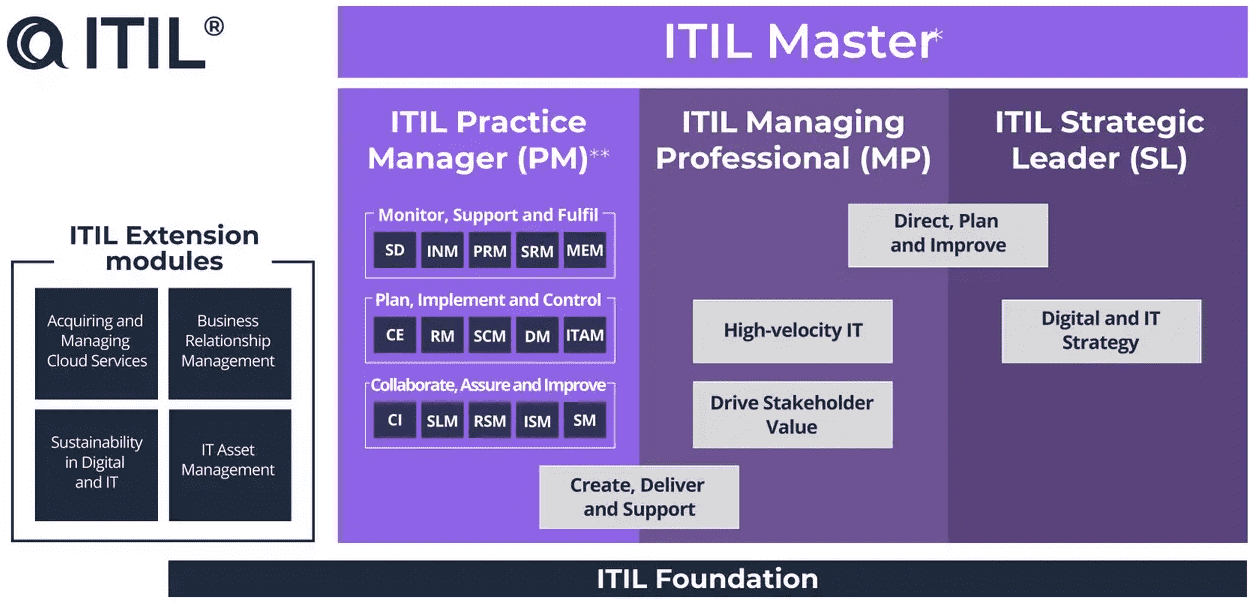Everything You Need to Know About ITIL Certifications
A guide for practitioners,
leaders, and ITSM enthusiasts
ITIL 4 was released in 2019. The latest version of IT service management (ITSM) best practice moved from the traditional lifecycle approach to a service value system model focusing on value co-creation, delivering outcomes to the business, and blending with other best practice frameworks. A new version of the framework also means a training refresh. This article will examine the current state of ITIL training offerings, the benefits of getting certified, and some tips on passing the exam.
ITIL training explained
The ITIL certification scheme is owned and managed by AXELOS, which is now part of PeopleCert. It is a series of qualifications focused on different aspects of ITSM that offer a modular approach to the ITIL framework.
The ITIL qualification pathway

Like previous versions of ITIL, it all starts with the foundation exam. This will give delegates a basic understanding of the core principles and a common language. But it's all changed from there. When AXELOS refreshed the training available for ITIL 4, they created several pathways:
- ITIL Managing Professional (MP)
- ITIL Strategic Leader (SL)
- ITIL Practice Manager (PM)
- Extension modules.
ITIL Managing Professional
The MP certification gives delegates the skills to run successful IT-enabled products and services. The four managing professional modules are:
- Create, Deliver, and Support
- Drive Stakeholder Value
- High-velocity IT
- Direct, Plan, and Improve.
ITIL Strategic Leader
This qualification helps IT leaders to better navigate the complexities of the digital world and prepare for digital transformation. The two strategic leader modules are:
- Direct, Plan, and Improve
- Digital and IT Strategy.
The eagle-eyed among you will notice that the strategic leader and managing professional streams have direct, plan, and improve modules. This is because both streams aim at people in management roles, and you need to strategize to manage effectively.
ITIL 4 Practice Manager
The practice manager certifications offer a short, dedicated burst of learning to people who want to specialize in a particular area - for example, if you just wanted to know about change enablement. Practice management courses include:
- Service Desk
- Incident Management
- Problem Management
- Service Request Management
- Monitoring and Event Management
- Change Enablement
- Deployment Management
- Release Management
- Service Configuration Management
- IT Asset Management
- Relationship Management
- Supplier Management
- Service Level Management
- Continual Improvement
- Information Security Management.
ITIL 4 extension modules
The extension models offer course content that extends the ITIL 4 framework, helping delegates future-proof their ITSM skills. The extension modules include:
- Sustainability in Digital & IT
- Acquiring & Managing Cloud Services
- Business Relationship Management
- IT Asset Management.
By offering a tiered approach, delegates can develop a solid understanding of service management or focus on specific areas of knowledge depending on what is needed by the individual. If you're unsure whether the ITIL certification is for you but want to learn the basics, do the foundation course and decide from there. You can always take more courses over time. Are you a practitioner who wants to dive deeply into your interest? Do the practice management modules that support your day job. Middle management that looks after live services? Look at the managing professional qualification, which will give you a holistic view of managing, running, and improving your service offering. In a leadership position (or want to be?), the strategic leadership stream is for you.
What about the ITIL Master qualification?
The ITIL 4 master qualification is automatically awarded to delegates who have completed the practice manager, managing professional, and strategic leader certifications. By combining the MP, SL, and MP courses and exams, the candidate has demonstrated their ability to apply ITIL's principles, concepts, methods, and techniques at strategic, tactical, and operational levels to deliver value to their organizations.
Why is the training and certification needed?
Previous versions of ITIL were quite structured and linear. By taking an ITIL 4 certification, you will:
- Improve your knowledge of the ITIL 4 material. By undergoing the training, delegates can understand the ITIL principles and apply them in real-life situations.
- Improve service delivery. ITIL qualifications provide IT professionals and their organizations with a structured model for managing IT services. This framework helps improve service delivery, increase customer satisfaction, and streamline processes and working methods.
- Stand out in a competitive job market. By having ITIL qualifications, you can prove that you know your stuff. Anyone can talk a good game, but if you have gone to the effort of understanding that course content and passing the exams, you can demonstrate to potential employers that you know your stuff.
- Develop and progress your career. Many roles have certain qualifications as prerequisites.
- Increase agility. ITIL is a framework that can be adapted to the needs of the business. Its principles can be tailored to fit the goals of an organization, allowing for flexibility in implementation while maintaining quality service delivery supported by industry best practices.
- Be able to demonstrate knowledge in a recognizable way to your peers. The ITIL qualifications are recognized globally and ensure that anyone who has them has reached a benchmarked level of experience and knowledge.
- Be prepared for the future. ITIL has been around since the 1980s and has continued to evolve. By staying current with your qualifications, you are future-proofing your career by ensuring that you understand and can apply the latest interaction of best practices.
Tips for passing the exam
As someone who has taken many, many ITIL exams in my time, here are my top tips:
- Read and understand the material. It sounds basic, but you need to know and understand the coursework. Like Ted Lasso says - the harder your work, the luckier you get.
- Engage with your training provider. All Accredited Training Organizations (ATOs) take pride in the courses they offer and the support they give some delegates. I was an ITIL trainer, and nothing made me happier than if all my delegates passed. OK, some of it was the bragging rights it gave me back at the office, but I mostly liked my delegates and wanted them to do well.
- Do as many practice exams as possible to get used to the exam structure and format and the types of questions you'll be asked.
- Make sure you feel comfortable going into the exam. Take a deep breath, have a drink, and make sure you have some emergency chocolate for when you need a quick sugar hit.
- Manage your time. The exams are multiple-choice, so have a plan for how you will make the best use of your time.
- Don't panic. If you get stuck or don't know the answer to something, make a note of it and move on. You can always come back to it later.
- Be careful of absolutes. In the immortal words of Obi-Wan Kenobi, "Only the Sith deal in absolutes," so if an answer includes phases like all, you must be careful. ITIL is a framework, so it isn't prescriptive.
- If in doubt, think about what ITIL would do. If you're stuck on a question - go back to the basics. Don't think about what you would do or how something is run in your organization - think about which answer best represents the ITIL framework and go with that.
Final thoughts
The new ITIL certification pathway helps ITSM practitioners achieve accreditation in a way that works for them and can benefit professionals at all levels, from newbies to aspiring CIOs. By studying for the exams, IT professionals can demonstrate their commitment to customer experience and service quality. ITIL qualifications help our people plan, design, manage, support and improve IT services effectively, efficiently, and safely. Feeling inspired to take a course soon? Let's do this!

